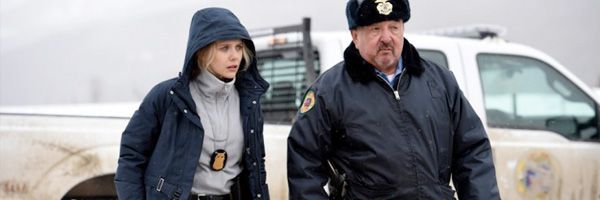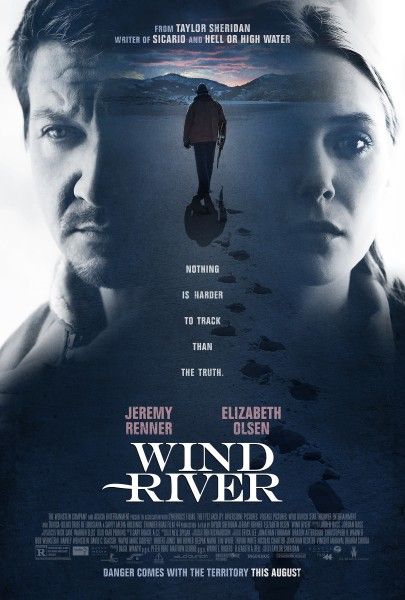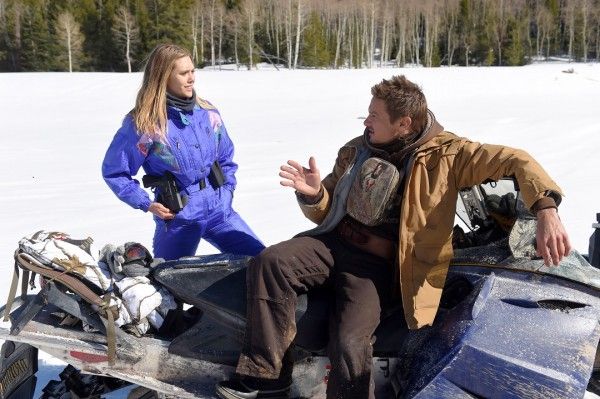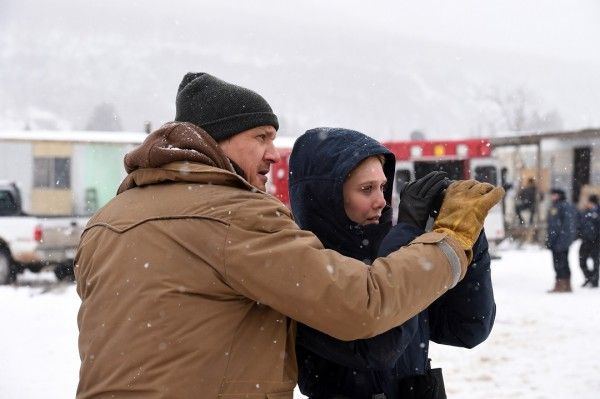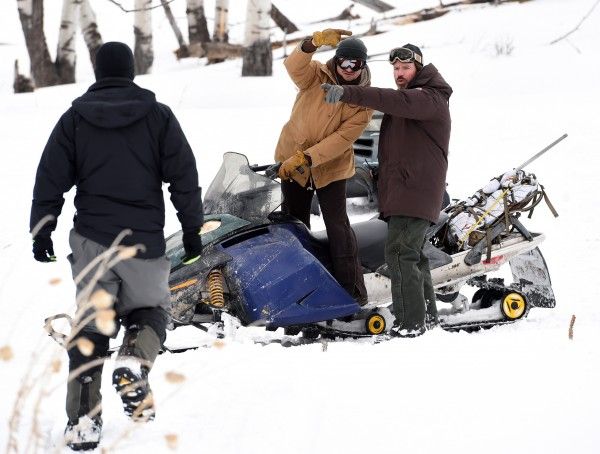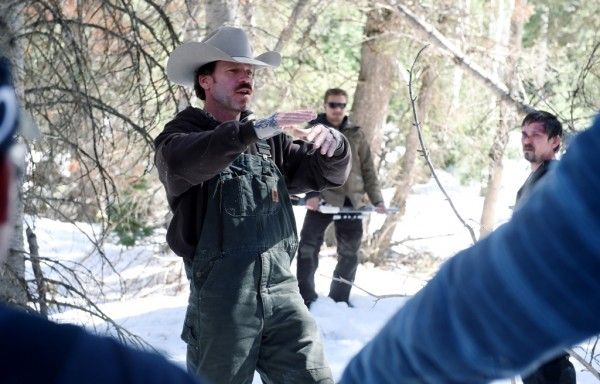Last week I got to talk to Elizabeth Olsen for Taylor Sheridan’s new film Wind River. The film marks directorial debut of the Oscar-nominated screenwriter (Hell or High Water) and follows a wildlife officer (Jeremy Renner) teaming up with an FBI agent (Elizabeth Olsen) to investigate a murder on a Native American reservation. It’s a powerful conclusion to Sheridan’s “frontier trilogy”, and I definitely recommend checking it out when it comes to a theater near you. Click here for my full review from Sundance.
During my conversation with Olsen we talked about what appealed to her about this character, how she prepared for the role, what it was like shooting on location, how it compares to filming on set, what it was like reteaming with Jeremy Renner, and more. She also recalls what it was working like with Renner on her first day on the set of Avengers: Age of Ultron.
Check out the full interview below. Wind River is now in limited release.
I wanted to start off by asking what was it about this character in particular that appealed to you?
ELIZABETH OLSEN: There's quite a bit that's appealing when you read it, comparison to the majority of scripts that I end up reading. It's an opportunity to play a part that I would never foresee myself having written for me, to be able to just develop more skill. It's kind of a terrifying thing to approach because there is a part of you that has to believe that you have the confidence or the ability to not distract an audience into believing that you are capable of being this, to having this profession. I loved the script so much and I was really scared that people see me holding a gun or walking, and be like, "She doesn't walk or shoot a gun like it's someone who should," and so I just focused a lot on the physical aspect.
I trained a long time, I think it's like six months, or three months of the gun and six months of self-defense and grappling and three months training for gun work with a former law enforcement officer. Then I did gun work in Utah with a former Green Beret. Just being around those kinds of men and hearing their stories and understanding the experiences they've had, the loss that they've had, their relationship to the government, their relationship to politics, to corruption, helped inform everything about the character, so it's really starting there and working my way in.
Your character comes from a really interesting place because she's not like a total neophyte but she is completely unfamiliar with the situation she finds herself in.
OLSEN: Yeah, and I think also, it's the audience's perspective, which is, especially an American perspective. We grow up knowing our own history but not understanding an entire culture of people that are our neighbors. We don't know much about what it's like to live on reservation, we don't know that there's discrepancies between reservation, federal law, in order for the reservation system to fail. It's just she is a fish out of water, but she's not because she's just like an ignorant person, she just is a part of the system that we're all part of and she tries to do her best within the world that she's in. She is smart enough to realize her own limitations and reaches out to other people for help, like Jeremy.
In researching this role, did you get a chance to speak with FBI agents about their experiences?
OLSEN: No, I did a lot of weird preliminary YouTube researching to see interviews of primarily female federal agents, and had the opportunity if I wanted to shadow an L.A.P.D. officer. That didn't make much sense for me to do that because her background's probably law school and just regular training that a federal agent would go through. She hasn’t had much on-the-ground experience. It made more sense for me to listen to the stories of the men that I was surrounded by and with the character and script provided, trying to figure out my own way.
One of the things I really like about this film is that it does have a unique setting, being set on an Indian reservation. Was there anything in particular that was surprising that you learned while making the movie in that regard?
OLSEN: Really just what I said, which is that the sad, systemic problems of reservation versus Federal Law and how little we provide as a government for resources to these reservations, so it's set up for them to fail with trying to bring justice to any kind of crime or murder.
I definitely think the film does a great job of shining light on that because I didn't know that going in for-
OLSEN: Yeah, I had no idea.
What was it like filming on location? I feel like the scenery is such a huge part of this movie and how it dwarfs the characters.
OLSEN: It was incredible to get to film in those conditions because it's what's in the script and it only, it's the obstacle that's there. You don't have to think about it, you're already fighting it. I think it also created a certain energy around set of quick, forward movement and us realizing that we only had a certain amount of time to try and figure out how to do everything as efficiently as possible. Our communication is very straightforward, it was really direct, no one was trying to protect anyone's ego. It was just a very creative discussion every day because we had to battle the elements and there wasn't time to waste. It ended up feeling like a ... Every night when you went home that you were tired and you felt like you had a good day at work.
This was Taylor's first film that he's directed. How was it working with him?
OLSEN: Great. You would never know. I've worked with directors whose film it's not their first time and they don't have the same kind of handle on the material or the crew as Taylor does. You walk onto the set with Taylor, you know who's running things, and that's always really important in a director.
You mentioned sort of when you're battling the elements, how does that affect a shoot day as opposed to when you're on a set and you have sort of more control over what's happening?
OLSEN: I think there's abandonment to larger, not power film, meaning any kind of esoteric or religious or whatever sense. I just mean you literally have to allow what's happening to happen, you can't control all the elements. You can be really nitpicky about the fog, about the lighting, about whatever and you end up, not necessarily wasting time because that's important to have control over those things and for things to look right, but when we were filming in those conditions you just have to abandon whatever preconceived idea you had of how things are going to turn out and you're going to have to work with it. You just think on your feet.
What was it like re-teaming with Jeremy for a project that couldn't be more different than a superhero movie?
OLSEN: The great thing is about Jeremy and I that the first day I got to work with him was on Avengers: Age of Ultron, we were in Italy. The first thing we had to do was usher 200 extras into a big ship. I was overwhelmed the size and by the amount of stuff that wasn't there and was talking to him about it. The only thing he was giving me as help was explaining to me about his character and his character's family and where he's coming from. Oddly enough, working with Jeremy in those worlds it's kind of the same ... You end up talking about the same things but you have more time or something like—to, obviously, you explore characters, differently.
You have the story that you're presenting to an audience is richer with character and backstory and history as opposed to trying to really quickly get in character so you can get into the next fight scene with.
It's fascinating because you've done both real indies, like Wind River, and Martha Marcy May Marlene, which I love as well as the huge blockbusters like Avengers. How do those two experiences compare? Do you prefer one to the other or is just a completely different experience?
OLSEN: I don't prefer one to the other but they do provide a different kind of satisfaction in work. I have a different feeling of accomplishment doing an action sequence, that I've been working hard on, than I do feeling like finally got to that moment have seen that I was a little nervous about and just kind of hoping that everything else would be there, the emotions and whatever and the backstory. I do think that they provide a different kind of sense of accomplishment. I really do enjoy doing both. I think when I finish a film where it's a lot more like more of a drama or emotionally-centered and I feel like when those over, I feel like I have a feeling of like I did something.
Wind River is now playing in limited release.

